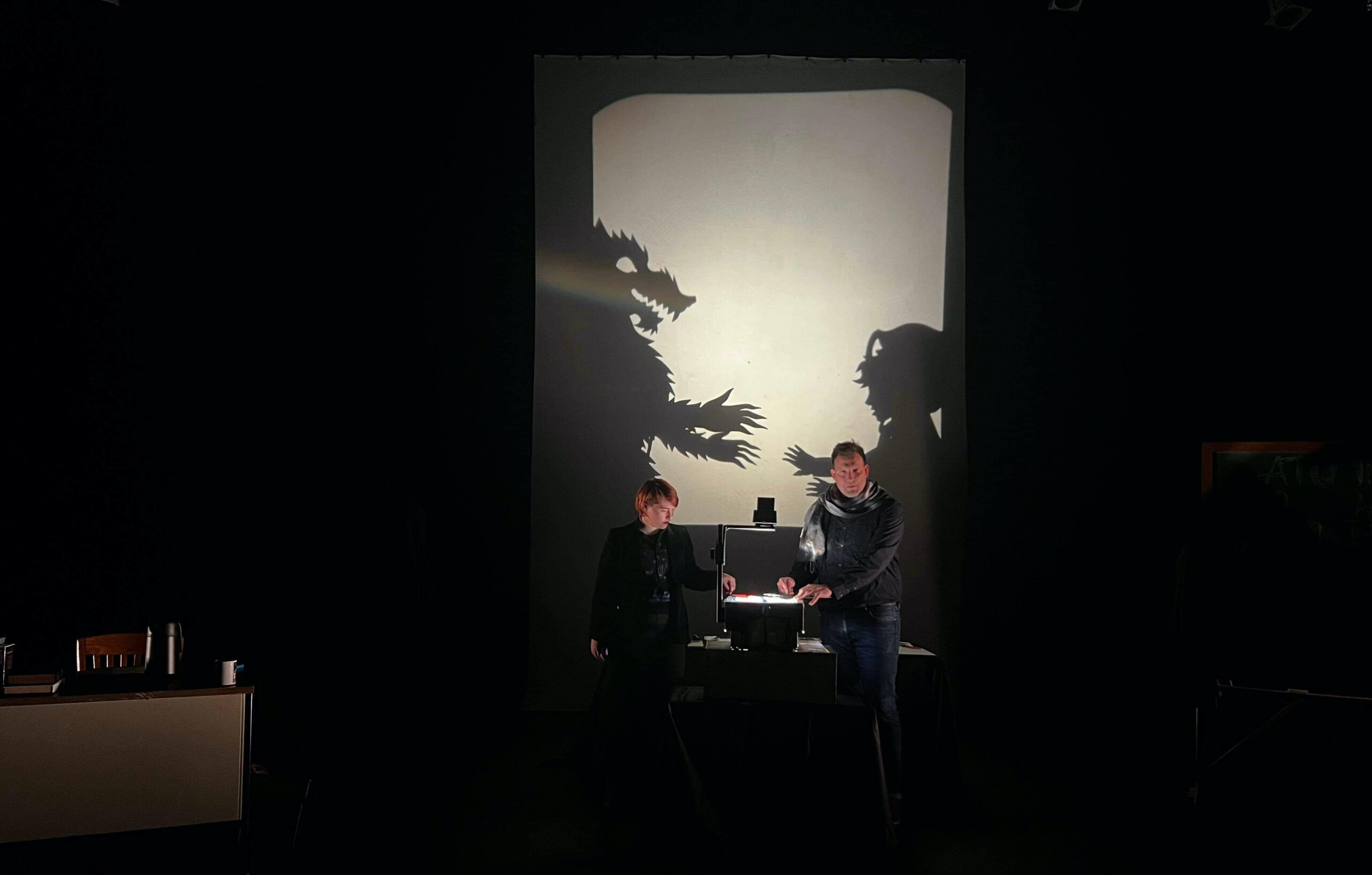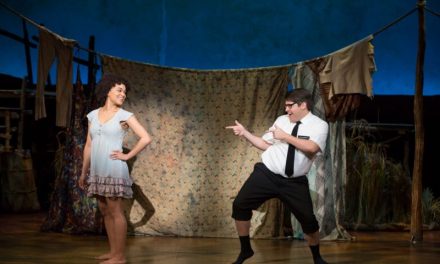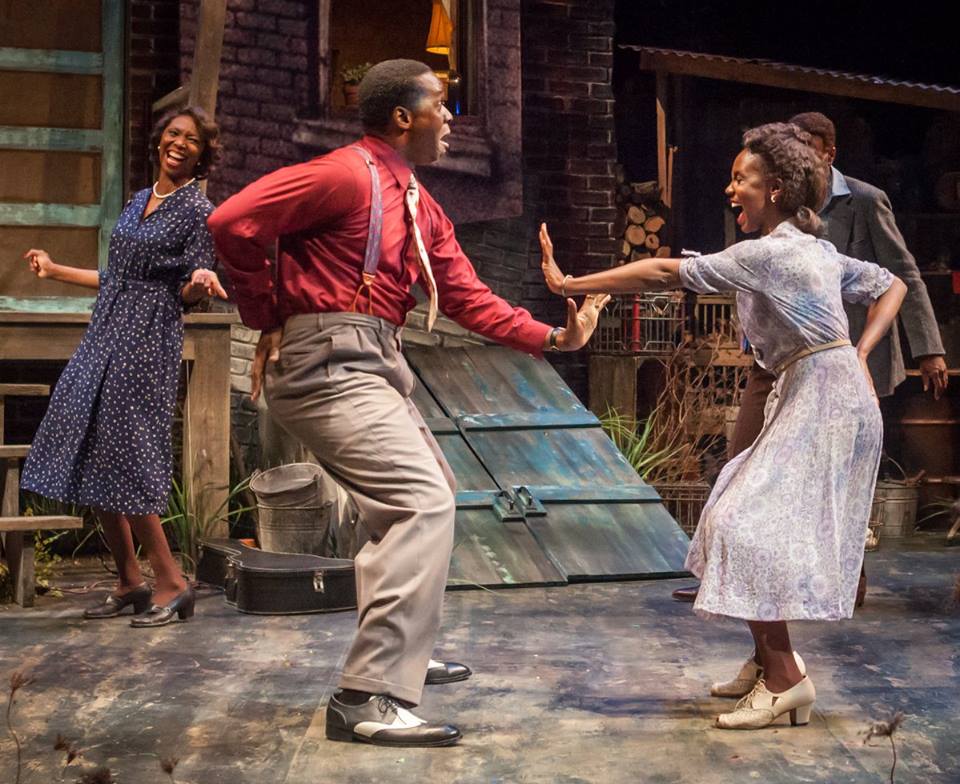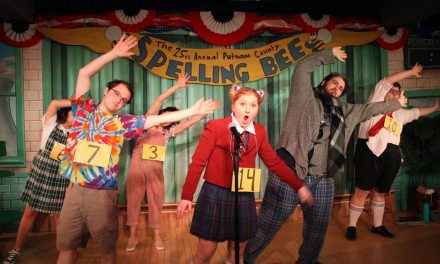Clarity Hagen & Allie Fireel in The Girl Crazy Queer. Photo: Hannah DeWitt
The Girl Crazy Queer and Other Fairy Tales
By Allie Fireel
Directed by Gil Reyes
Co-Produced by Allie Fireel and Pandora Productions
A review by Tory Parker of a preview performance.
Entire contents are copyright © 2022 Tory Parker. All rights reserved.
“What is it about the woods?” is a question from another play entirely, but as I watched Allie Fireel animatedly guide me through the fairy tale childhood of Girl Crazy, and struggle through the darkness in their retelling of Little Red Riding Hood, it kept creeping into my mind like ivy. Storytellers love the woods because—as Stephen Sondheim so clearly tells us—anything can happen there. The woods are fertile ground for the imagination, crawling with danger, possibility, adventure, and even magic. When a Great Man in literature wants to make his mark or his name, he goes to the city, or he goes West. But the queers? We go to the woods.
The Girl Crazy Queer is not a comedy, though it made me laugh. It is not a tragedy, though it strayed dangerously close to the edge. It is, I think, a meditation—on story, on memory, on hurt, and the transformation that can, if we’re lucky, follow. Fireel, as both teacher and student, is our guide in these woods and there are many stops along the way.
We are taken all the way back to the beginning, in a small town in Alabama, where hurt at the hands of a brutalistic Catholic school first sunk into the bones. It’s here, for the first time, Fireel confronts us with the idea that we are all unreliable narrators of our own history. Are the memories we have really memories, or are they just the stories we’ve told ourselves enough times to recall? It’s a fascinating, and very real, phenomenon, that we can replace our own memories over time, tell ourselves the stories we want to hear, and it sets the path of the play before us.
From there we follow the path to their job as a teacher, determined to be a stalwart of support to the queer kids who need an advocate in that space. But that path is treacherous and winding. It’s designed to wear you out and grind you down, and it is narrow. Fireel shows how even someone with the very best intentions, with all the love in the world for the students, with a natural talent and desire for teaching, could get their heart broken by a path like that, especially when it’s crawling with monsters.
Skillfully and intentionally, Fireel never lets you forget that they are not simply a storyteller, but a theatre-maker. The Girl Crazy Queer, written and performed by Fireel, both explores how theatre can be deeply, mercilessly vulnerable, and confronts the separation and disconnect they might allow themselves to enjoy by the nature of performing a part. But this play, so deeply a part of them, demands genuine connection. Those moments shine brightest when Clarity Hagan joins them onstage. Hagan, embodying a student and Little Red, is the children that listen. If this is the story of the Fireel’s fight through the woods to arrive safely home in the cottage of their own queerness, Hagan is the wide-eyed recipent, consuming it whole, learning its lessons and making it their own.
The set is minimal outside of what is needed for a classroom—nothing is superfluous dressing or distraction. At the center is an old-school overhead projector, which serves as a stage for extraordinarily beautiful shadow puppets by artist Monica Stewart. They are sharp and evocative, clearly whimsical and fantastical, but still communicating the snarl of the wolf and the deadliness of a knife blade. At the projector, we’re invited into the thorns and brambles of Fireel’s imagination. The scenes featuring their prose alongside Stewarts designs are simple, told like children’s stories have been for centuries, but their larger than life scale on the back wall wraps the audience in their melancholy. For just a bit, we are bipeds in the cave, watching shadows on the wall, and the stories feel infinite, eternal.
Speaking to their class of high school students, Fireel fields the question of whether or not it is important to tell the “original versions” of fairy tales. The simple answer is that there is no “original” version of any fairy tale, that they have been told and retold and written and rewritten too many times for them to have definitive “origins.” The complicated answer is that the version of the story we tell depends on what we want the audience to get out of it—the lesson we want them to learn. The standout moment of Fireel’s performance comes at their realization that these stories of transformation, of belonging, of longing and heartache, of magic, have had their queerness stripped away systemtically, violently, until we can barely see ourselves at all. They were our stories, and they were thrown to the wolves.
But the tale you tell, that is the spell. And Allie Fireel’s tale, the life they have carved for themselves here and the community they have helped to build, is a testament to the power of storytelling. They have borne witness and made space, they have uplifted and invited, and as teacher, student, and friend, are leading us into the woods, out of the woods, and home before dark.
The Girl Crazy Queer and Other Fairy Tales
Oct 27, 28, & 29 @ 7:30 PM
Featuring Allie Fireel, Clarity Hagan, and the voice of Nicholas Wills
Pandora Productions and
The University of Louisville Department of Theatre Arts
Henry Clay Theatre
604 S. Third Street
Louisville, KY 40202
Tory Parker is originally from West Virginia, graduated from Centre College, and now works in marketing at the Waterfront Botanical Gardens. In Louisville, she’s worked and performed with Claddagh Theatre Company, the Chamber Theatre, Bellarmine University, Wayward Actors Company, Derby City Playwrights, Company Outcast and director Emily Grimany. As a playwright, her original works appeared in the National Women’s Theatre Festival in their 2020 and 2021 Fringe Festivals.





